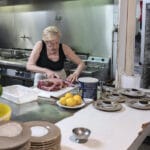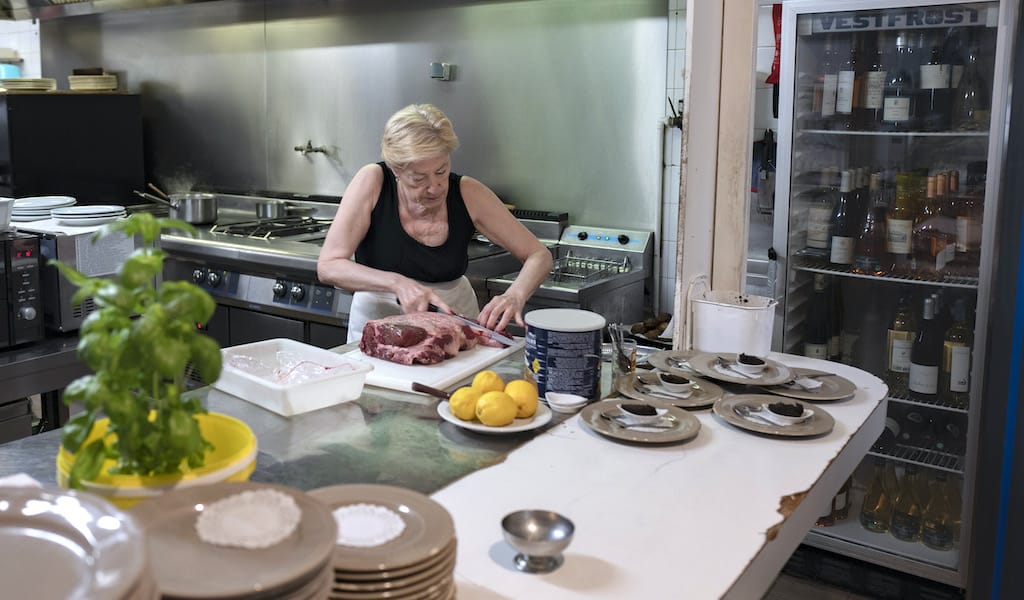The walk to Sur le Pouce, a popular Tunisian family restaurant, is a straight shot from Marseille’s central boulevard, La Canébiere. We make our way along rue Longues des Capucins, behind Alcazar, the main public library, pass the Chinese wholesale clothing stores – Joy Lady, Wei Wei, and New 35 – and arrive ten minutes and several wonderous lands later to the corner of rue de la Convalescence. At the door of Sur le Pouce, we find ourselves in the heart of downtown Marseille and the populaire, working class, Belsunce neighborhood, largely inhabited by people of Maghrebi heritage, both French nationals and recent arrivals.

The busy, piquant Sur le Pouce is an integral part of this neighborhood. Inside is a long counter with Tunisian pastries in formation on one side, a wall-mounted television set on the door side – this time set to a music channel featuring pop superstar Stromae. Comfortable booths line the wall opposite the counter, leading to the main part of the restaurant. It is a modest space aggrandized by mirrors, walls painted earth red and mustard yellow, decorated with tableaus of oriental scenes, including a central one of a veiled woman – all framing the lively diners who sit at tables close together.
Through a peek window we can see the kitchen, with pots of heady tagines, a great tray of yellow couscous, and the cooks passing all the prepared dishes through the small arch to be quickly scooped up by the servers, the owner (who often cooks as well), one of his children, or another cook, as everyone working here lends a hand.

We didn’t catch the owner on this visit, but spoke with his son, Hedi (whose given name is Malek). Malek explained that his father was just then in Tunis visiting family, and buying essential spices like the tangy Tabil mix of ground fennel, coriander, clove, cumin seeds, turmeric, peppercorn, cumin, and chilis. He loves his work, notes Malek, and he never seems to stop working, wherever he goes. When he first moved from Tunisia to Libya, then to France at eighteen, Malek’s father worked as a plumber, then as a server in couscous restaurants, where soon enough he was cooking. By the early eighties, he was able to open his own restaurant.

Malek does all the restaurant’s accounting, but he clearly enjoys performing certain daily rituals with his father, like entering the kitchen every morning to taste all the dishes. He remarks proudly that his father can tell if the couscous is cooked to perfection with just a glance.
All guests are first served a small plate of harissa to eat with baguettes. Tunisian harissa (which in Arabic means to pound or break up), homemade by a caterer, is a hot sauce of chilis crushed with garlic, lemon, and spice, and an essential accompaniment for Tunisian and Algerian couscous and tagines. And at Sur le Pouce we must (gently) fire up our palettes even before our orders arrive, while we converse and watch the other diners.

Most of the customers are local professionals, students, and regulars – Marseillais, as young generations identify, deliberately sidelining French, Algerian, Comorian, or any other pure-form labels. And most who eat at Sur le Pouce are from the neighborhood itself. Many teachers and students in nearby schools and Aix-Marseille University come every day for lunch. The restaurant always includes some visitors to Marseille (they make up around 20-25 percent of the clientele in the summer, and much less in the winter), but only the kind who would stake out a place like this, willing to try the delicious harissa straight up and with no hesitation. (Most tourists choose one of the couscous restaurants close to the Vieux Port that caters to them, serving alcohol.)
Visitors or residents, we come for the good bled food, of the old country, and the authentic Marseillais scene. This time we order the couscous speciale, with an oven-roasted souris d’agneau, lamb shank wrapped in foil, which comes with separate plates of couscous and the orange-red sauce full of chickpeas, large pieces of squash, butternut, potato and carrot. The lamb shank is cooked to a fall-off-the-bone tenderness in now-melted garlic and spice. The reduced sauce had simmered for hours, the vegetables are tender but hold form, absorbing the spice and tomato. It is warm comfort food, served to be shared and savored.

Malek has new ideas for Sur le Pouce, and his father gives him free reign. For example, Malek plans to ship back from Tunisia hand-made ceramic dinnerware in the restaurant’s gold-red colors. In September, he will introduce a variety of regional Tunisian specialties as plat du jour, like oven-baked whole fish tagine, shakshouka with potatoes (and with eggs, of course, because “no eggs, no shakshouka,” Malek points out), or omelette with merguez (a spicy lamb sausage from the Maghreb). These offerings would be an innovation in Marseille’s maghrebi restaurants, labeled as Tunisian or Algerian or Moroccan—but in fact, Maghrebi cuisine is more local than national. Sur le Pouce has a substantial Maghrebi-French clientele who would appreciate such local Tunsian fare, and the rest of us will benefit, too. We can consider Marseille itself a region of the Maghreb as well as of France, and Malek’s idea is to offer, by serving a variety of regional dishes, the possibility to “travel” without leaving Marseille.
This article was originally published on September 07, 2022.
 May 11, 2022 Oumalala
May 11, 2022 Oumalala
A month ago, I moved into to my new place in Marseille’s La Plaine neighborhood. After […] Posted in Marseille September 21, 2021 Tava Hada Pilpeta
September 21, 2021 Tava Hada Pilpeta
Though synonymous with Tunisia, Algeria and other North African nations, harissa’s main […] Posted in Marseille December 11, 2023 Paule et Kopa
December 11, 2023 Paule et Kopa
Though Paris is littered with brasseries boasting classic French cuisine, Marseille […] Posted in Marseille
Jenine AbboushiMarion Péhée and Medi Musso
Published on June 05, 2023
Related stories
May 11, 2022
Marseille | By Jenine Abboushi
MarseilleA month ago, I moved into to my new place in Marseille’s La Plaine neighborhood. After the moving truck drove off, leaving me with stacks of boxes and furniture and no food yet in the refrigerator, I ventured out in my dusty jeans to find a place to eat some lunch in the neighborhood. On…
September 21, 2021
MarseilleThough synonymous with Tunisia, Algeria and other North African nations, harissa’s main ingredient helms from Mexico. After 1492, chile peppers crossed the Atlantic via the Columbian Exchange, trading between the New World and Old World. It was Spain that introduced Tunisia to the spicy capsicum during their 16-century occupation. The Arabic verb harasa means “to…
December 11, 2023
MarseilleThough Paris is littered with brasseries boasting classic French cuisine, Marseille lacks restaurants that solely specialize in our traditional fare – a mix of Provençal garlic, tomatoes and olive oil, and the freshly caught delights of the Mediterranean. When we lamented this at a dinner party the other night, a woman chimed in, “What about…






















































































